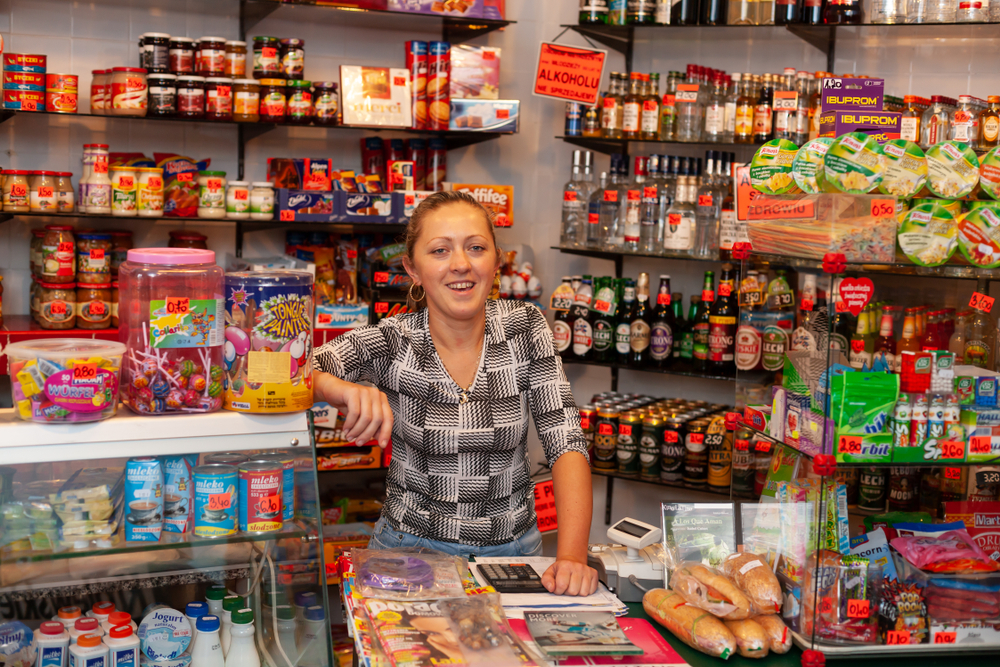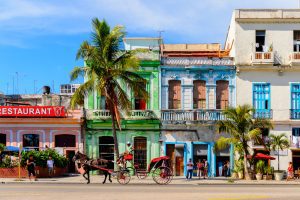Poland’s supermarket landscape has historically been dominated by small, independent grocery stores. Convenience stores are also popular, particularly in densely populated cities.
As the economy grows and people move to the suburbs, Poland has seen a rise in large, modern supermarkets. Shoppers now have a range of options, from classic grocery stores like Biedronka to the French Intermarché hypermarkets. Even so, the selection of stores is limited; just 17 brands offer 100 or more supermarkets in Poland.
Traditional small grocery stores are falling out of favor with many Polish shoppers. In 2020, more than 5% of these compact stores closed for good.
Many of the closures were driven by economic conditions, online shopping, and convenient full-service stores.
Whether you’re searching for a quick snack or a full kitchen restock, these supermarket chains have you covered.
Table of Contents
The Biggest Supermarket Chains in Poland
| Number | Supermarket | Number of Stores |
|---|---|---|
| 1 | ABC | 8700+ |
| 2 | Żabka | 6561 |
| 3 | Lewiatan | 3200+ |
| 4 | Livio | 3000 |
| 5 | Biedronka | 3000+ |
| 6 | Odido | 2500+ |
| 7 | Dino | 1622 |
| 8 | Lidl | 700+ |
| 9 | Stokrotka | 600+ |
| 10 | Netto | 388 |
| 11 | Chata Polska | 302 |
| 12 | Polomarket | 283 |
| 13 | Intermarché | 199 |
| 14 | Mila | 184 |
| 15 | Aldi | 140 |
| 16 | Topaz | 116+ |
| 17 | Arhelan | 101 |
| 18 | Auchan Supermarket | 33 |
| 19 | Frac | 21 |
| 20 | Mere (Svetofor) | 1 |
1. ABC: 8700+
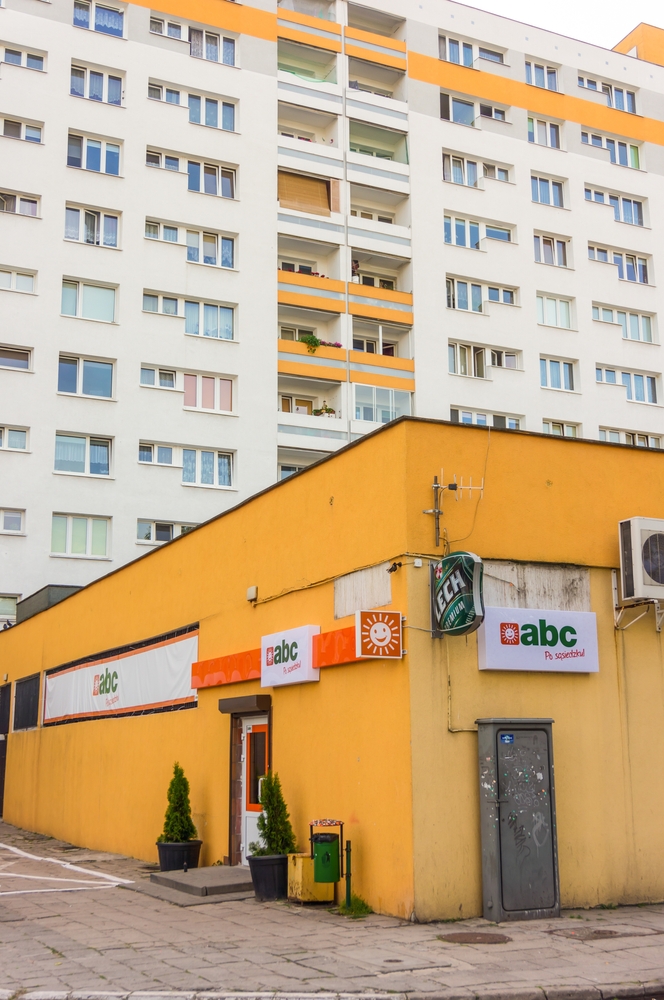
With more than 8,500 locations across Poland, ABC is one of the largest retail chains in the country. Technically, ABC is considered a convenience store; however, its individual locations are considerably larger than traditional small markets.
ABC stores carry a wide range of essential items, including alcohol, snacks, and more. The stores are scattered across both rural and urban locations in Poland, allowing broad access. In many cases, they’re located near major residential complexes for convenience.
2. Żabka: 6561
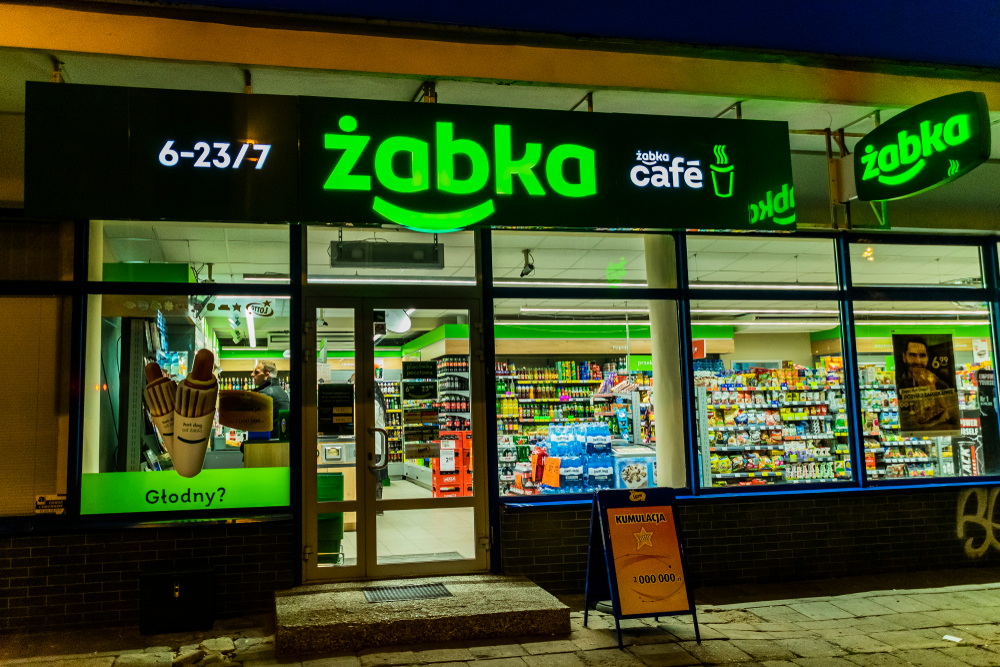
Known for its iconic, bright-green logo, Żabka is a familiar brand in Poland. These small grocery stores are clean and modern, offering a standard range of snacks, drinks, and light meals. There are more than 6,500 branches throughout the country.
Most Żabka stores are run by cashiers. In Poznan, however, you can find a single location that’s run by artificial intelligence. Customers can sign in with the app, which tracks their purchases and charges their stored payment method.
3. Lewiatan: 3200+
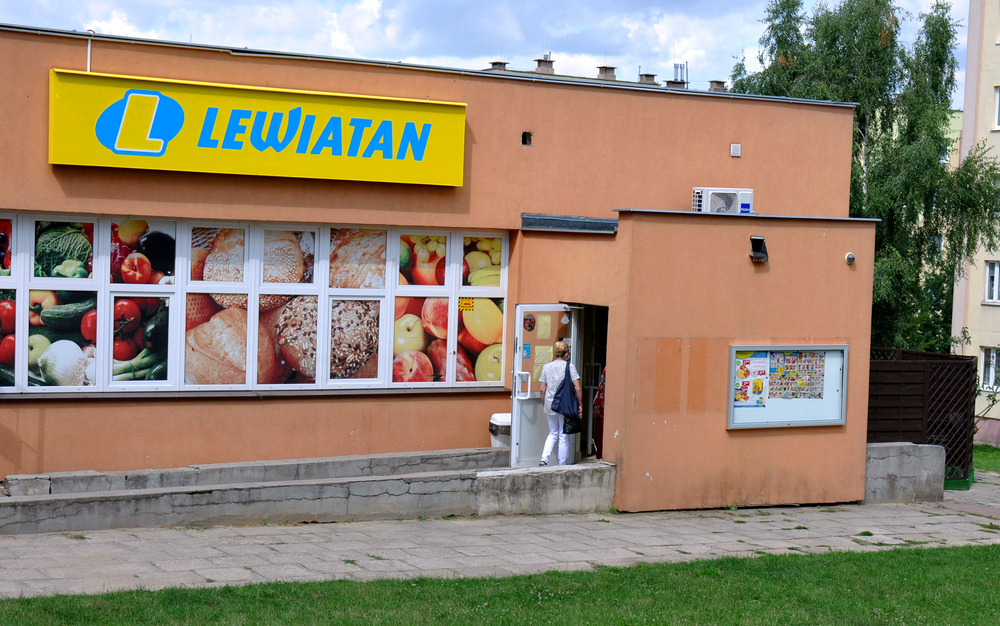
Lewiatan, which is Polish for “Leviathan,” is a convenience store chain that operates more than 3,000 stores in Poland alone. The company places these compact markets in strategic locations, so they’re easily accessible for commuters.
The Lewiatan brand has been around since the 1990s. By 2001, it had grown enough to support an in-store brand of food items. Today, the company is part of the Eurocash family of brands.
4. Livio: 3000
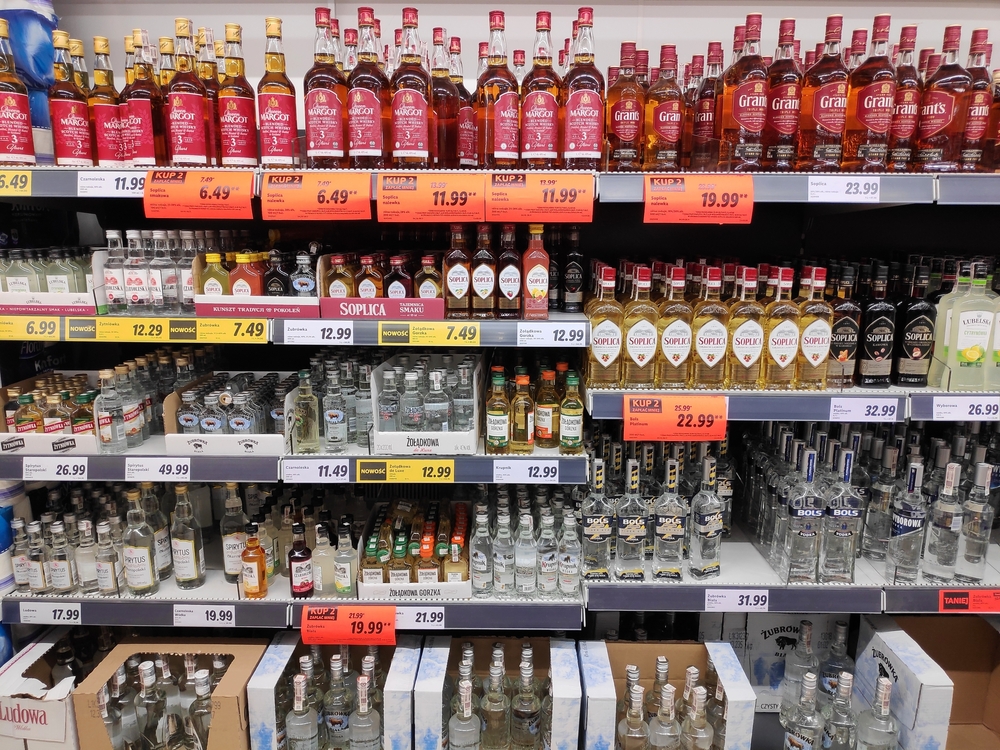
Livio is a Polish brand that operates approximately 3,000 different grocery stores. While other large chains have widespread coverage, Livio doesn’t have a presence in every part of Poland. However, the company is constantly expanding.
Livio stores are small and focused on convenience and only carry a small selection of essential items. These shops mostly cater to people who need a few supplies on the go.
5. Biedronka: 3000+
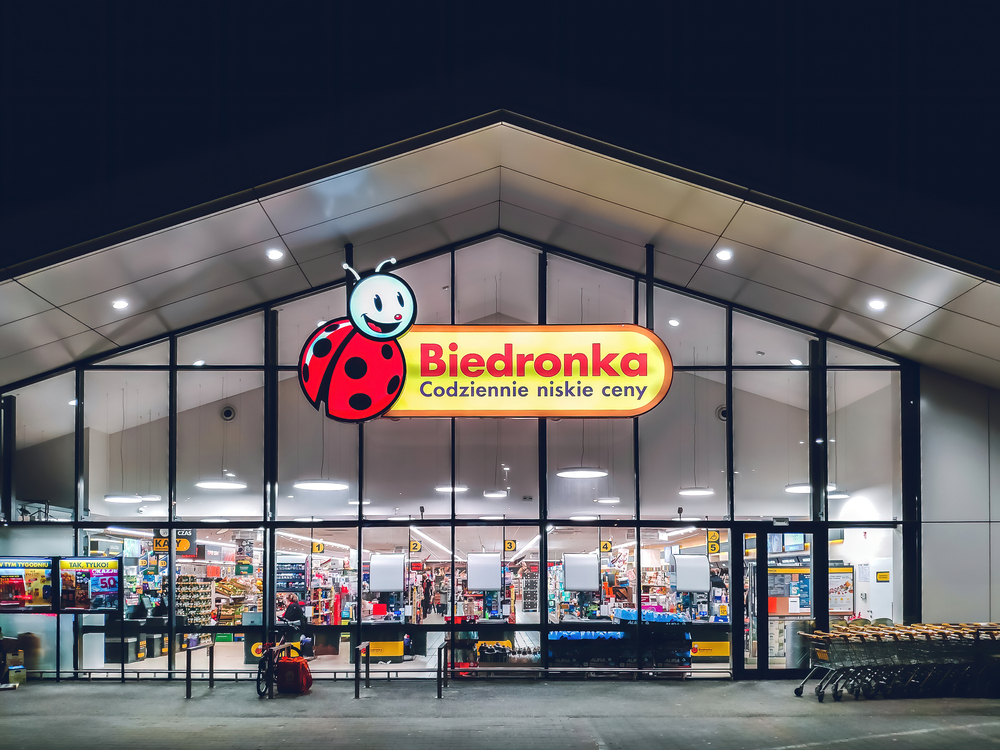
With more than 3,000 locations, Biedronka is the largest chain of full-size supermarkets in Poland. You’ll see the store’s recognizable yellow and red insect logo in cities across the country – it’s a nod to the store name, which means “ladybug.”
This supermarket chain is designed for full-service shopping. Each store carries everything shoppers need to stock a kitchen, including fresh produce, dry goods, and deli items. The stores tend to have an industrial feeling with exposed ducts and fluorescent lighting.
6. Odido: 2500+
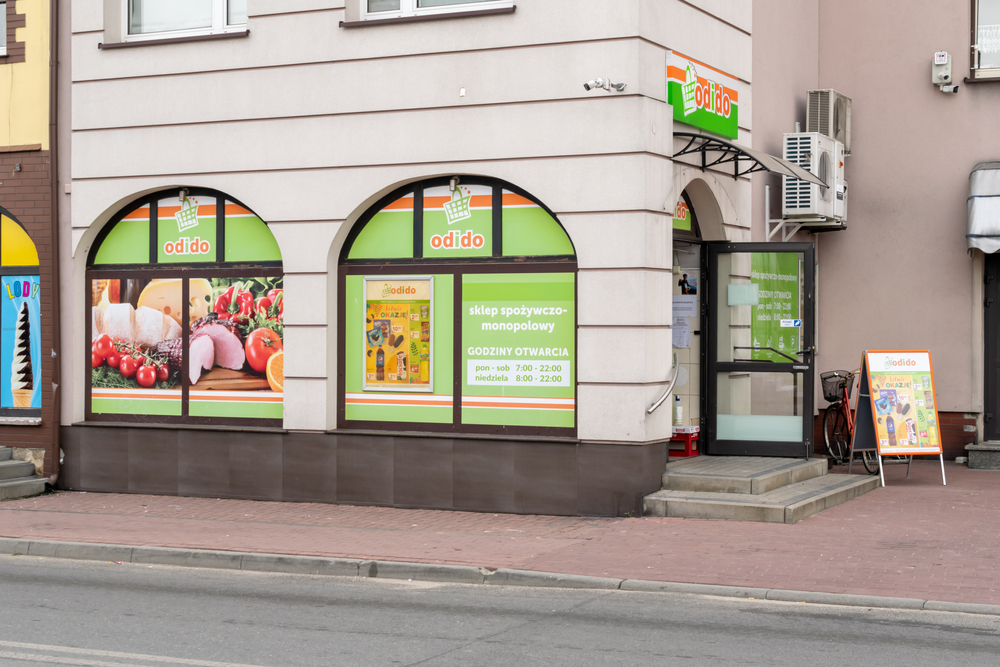
There are more than 2,700 Odido grocery stores in Poland. Since it launched in 2,010, the company has established a presence in more than 1,400 cities. It continues to grow and expand, opening new locations regularly.
As one of the newer Polish supermarket chains, Odido uses a hybrid convenience store/grocery store format. Shoppers can check out grab-and-go meals or visit the wine section for a bottle of red or white. Most Odido stores are small and located in urban areas.
7. Dino: 1622
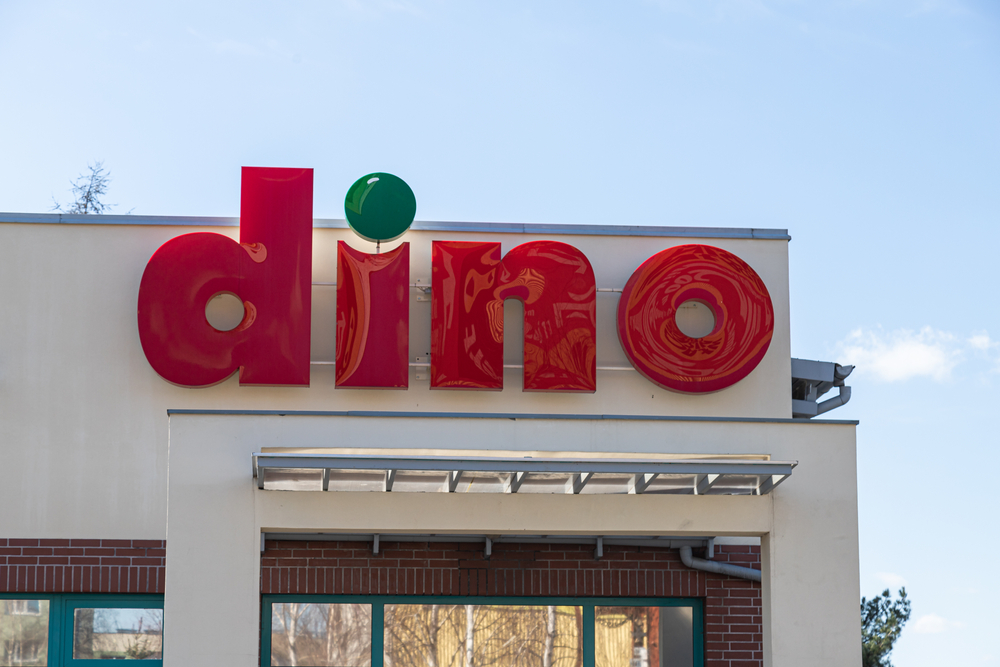
Everywhere you go in Poland, you’ll see a Dino grocery store. Big and spacious, these stores tend to be located in rural and suburban areas. They offer a wide selection of grocery items, including a large frozen section and plenty of fruits and vegetables.
Dino has been around since 1999 and has expanded to more than 1,600 shops. Founded by Tomasz Biernacki, the company maintains its headquarters in the city of Krotoszyn. The corporate distribution network is also located in Poland.
8. Lidl: 700+
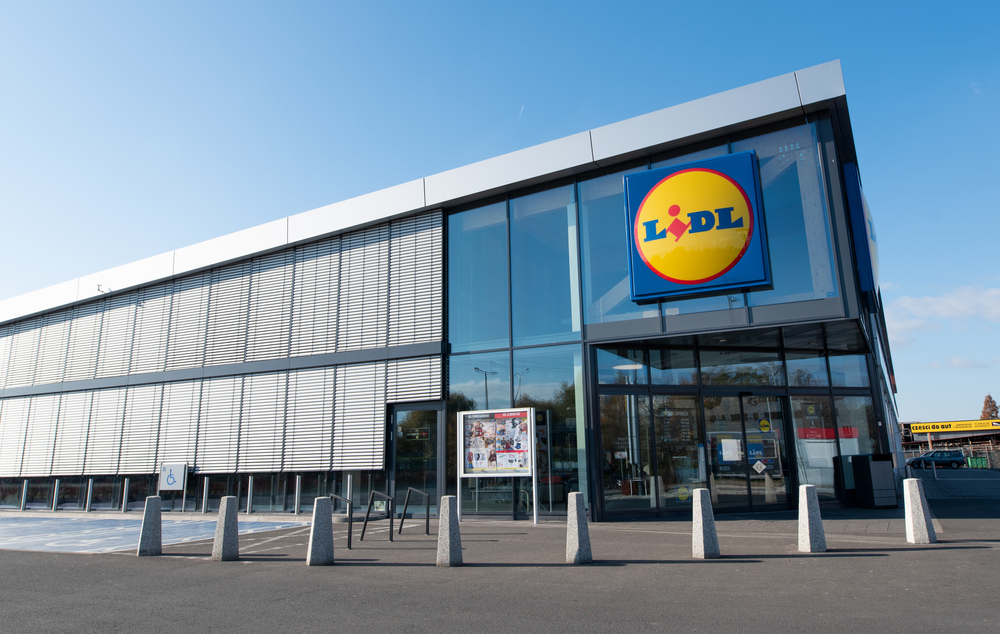
Lidl is a German supermarket chain with a large Polish presence – there are more than 700 Lidl stores around the country. This is a small percentage of the company’s worldwide operations, which includes more than 11,000 grocery stores.
Each Lidl store uses a sparse, simple design. Customers won’t find fancy display centers; instead, food is often set out in its original boxes and crates to reduce waste and cut costs. Despite its no-frills approach, this chain often offers fresh baked goods and produce.
9. Stokrotka: 600+
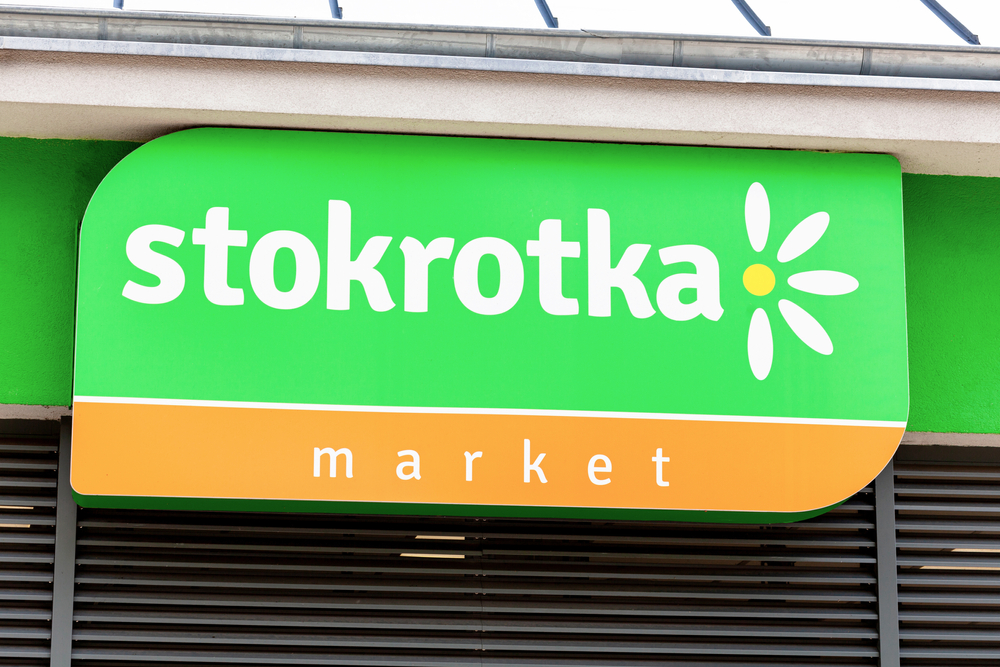
With 600 branches in Poland, Stokrotka is one of the country’s most popular grocery stores. The business is headquartered in the city of Lublin, though it’s owned by a firm in Lithuania. The name means “daisy,” which explains the flower in the store’s logo.
Most Stokrotka stores are medium-sized, enabling them to find space in both cities and smaller towns. The interiors are bright and spacious, creating a pleasant shopping experience. In urban areas, the brand often opens small shops with a traditional, convenience-store feeling.
10. Netto: 388
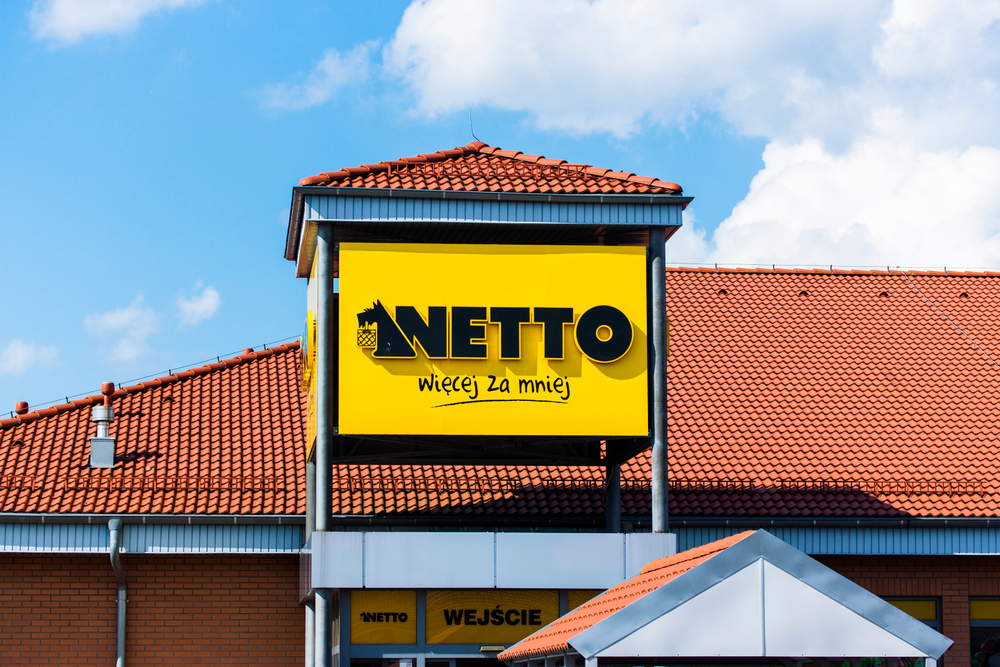
Netto is a Danish supermarket chain that operates about 400 stores in Poland. In May of 2021, the company bought out all of the Tesco stores in the country; when it completes its rebranding process, the company will own nearly 800 locations.
Netto uses a discount model. Most locations have a crisp look that’s inspired by Danish design – expect neat aisles and plenty of space to move. The bold yellow and black branding appears liberally throughout the store.
11. Chata Polska: 302
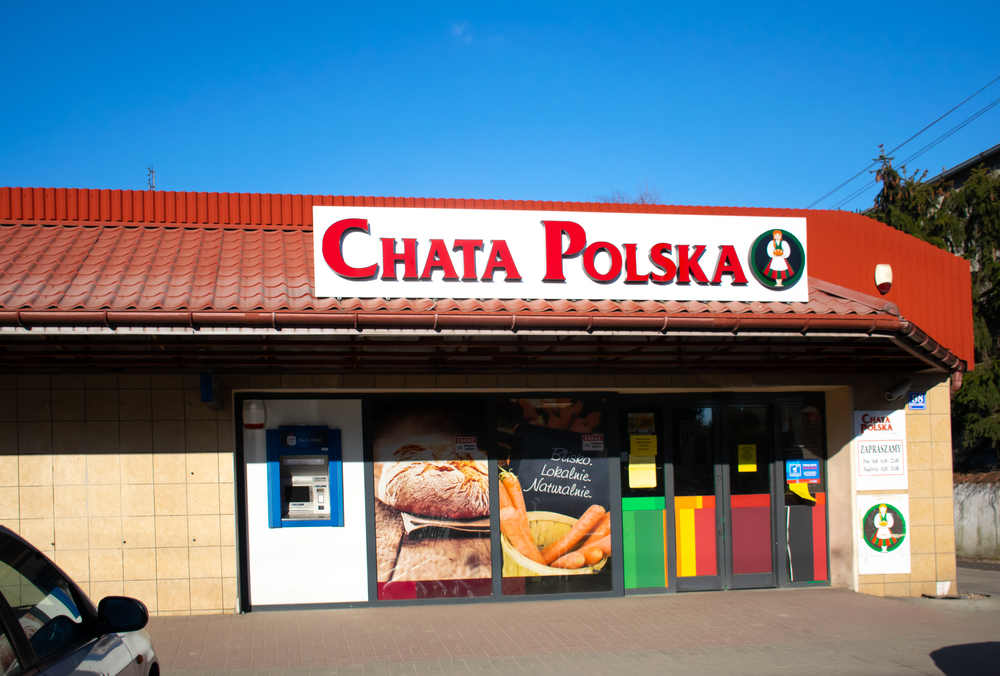
Chata Polksa is a Polish supermarket chain with more than 300 stores. This brand has a limited presence in the country but is expanding slowly to new regions. It operates on a franchise model.
Chata Polska stores are known for their attractive interior design, particularly in the produce and bakery departments. Suburban and rural locations are more common, but the company also runs a selection of compact city branches.
12. Polomarket: 283
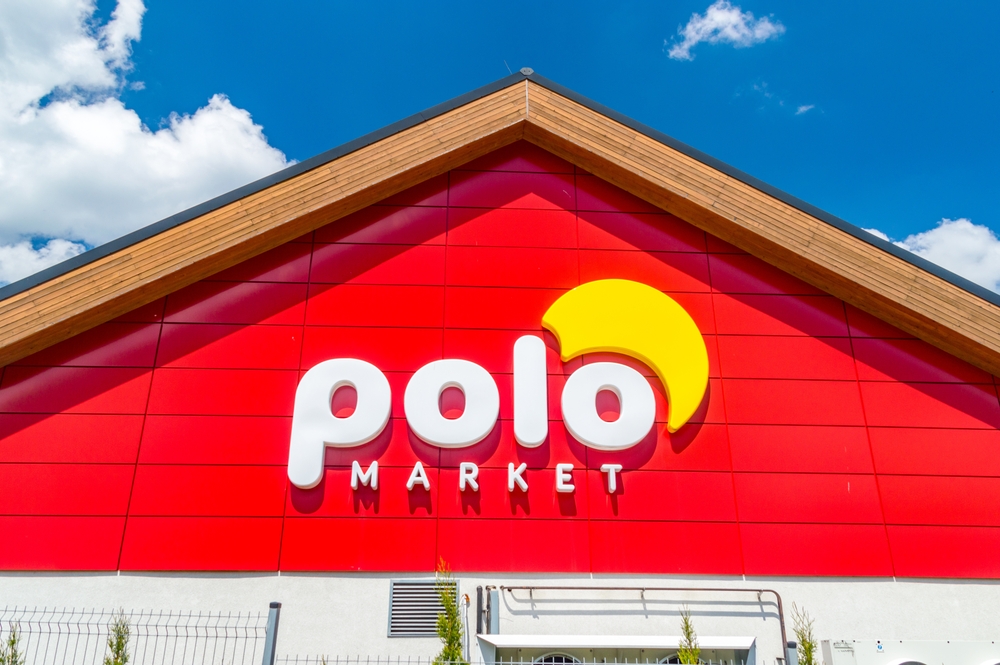
Polomarket stores are easy to recognize – each one is marked with the company’s bright red, yellow, and white branding. With nearly 300 locations, this chain is well-established.
Throughout Poland, Polomarket operates both large and small stores. Larger markets use a modern supermarket design, with deli, baked goods, and produce. Smaller branches look and feel more like a convenience store than a grocery store.
13. Intermarché: 199
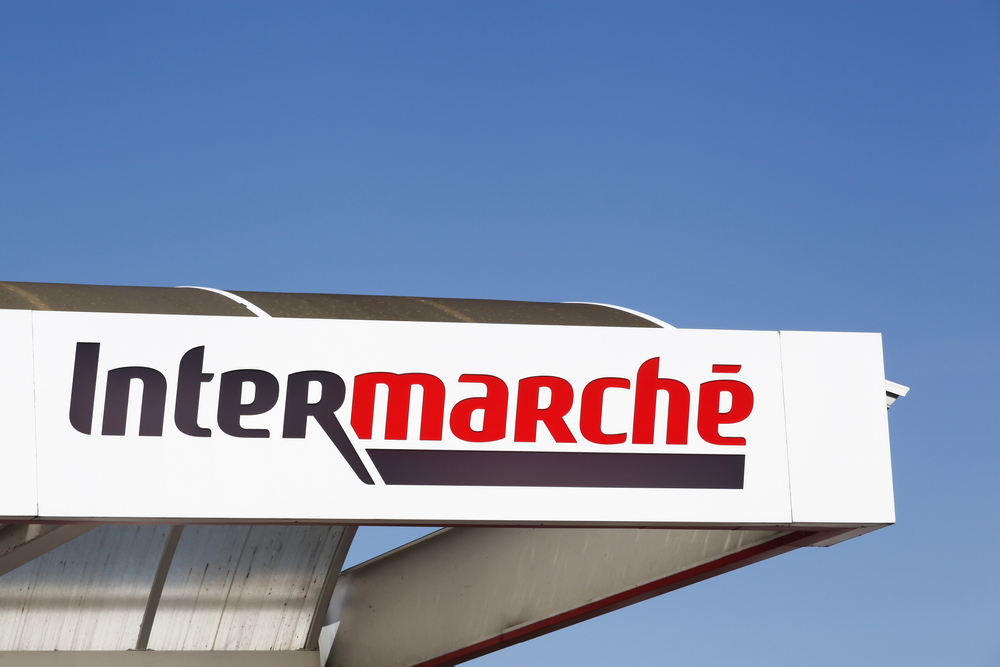
As the name suggests, Intermarché is a French-owned company. It has 200 stores in Poland, with options including hypermarkets, grocery stores, and supermarkets. The brand has been in business since 1969.
The majority of Intermarché’s Polish locations are hypermarkets – large, expansive stores that carry a broad range of products. In addition to food and basic supplies, these big-box locations sell home goods, clothing, electronics, and more.
14. Mila: 184
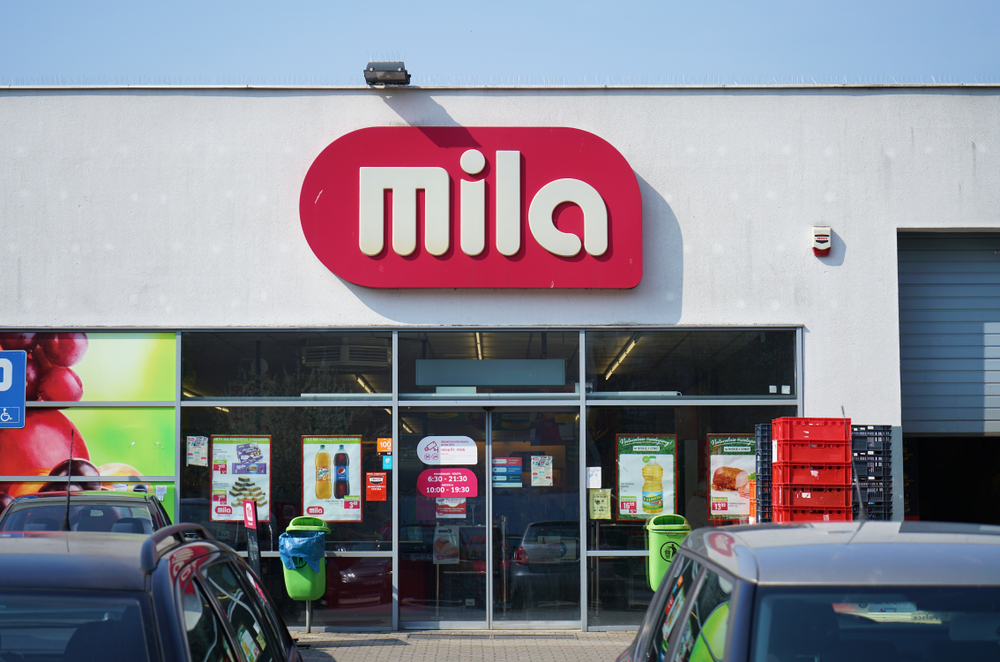
Mila is part of the Eurocash family, which also includes the Lewiatan chain. In 2018, Eurocash purchased the 188 Mila supermarkets. For customers, the brand’s shopping experience and signature red and white branding remain the same.
Most Mila stores are located in the central region of Poland. The company operates express-style city branches as well as full-size traditional supermarkets.
15. Aldi: 140
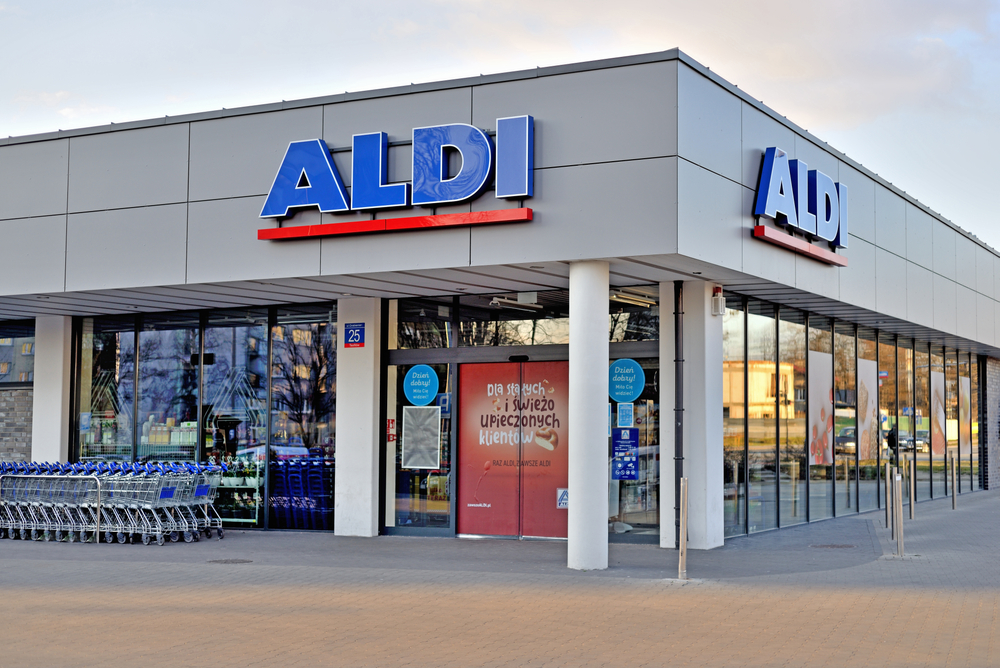
Like Lidl, Aldi is a German supermarket chain that has expanded into Poland. This chain operates about 150 stores. Most locations are located in the southwestern section of the country.
Aldi is a discount chain that uses a simple, uncluttered display system to reduce costs. Customers must bring their own bags or boxes, and merchandise is often displayed in its bulk-packaging crates. Aldi usually carries a wide range of items, with a limited number of options for each product type.
16. Topaz: 116+
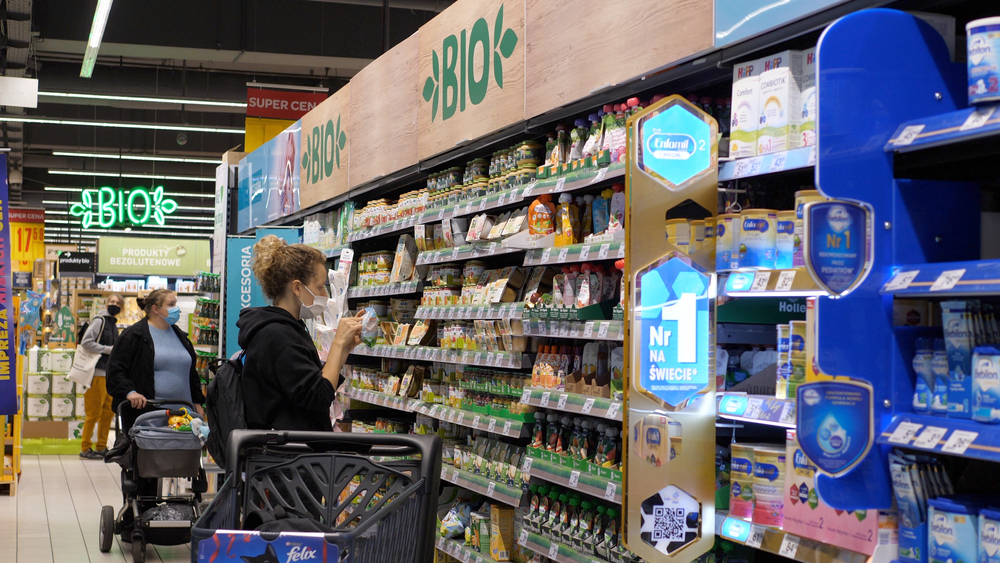
Topaz is a Polish chain with more than 120 stores. Established in 1993, it quickly grew from a single location. Today, the company offers franchise opportunities to people around the country.
The original Topaz stores were traditional, medium-sized supermarkets. In the early 2000s, the company started offering a new type of store – the “Express.” These compact shops were designed for urban areas with limited space and parking.
17. Arhelan: 101
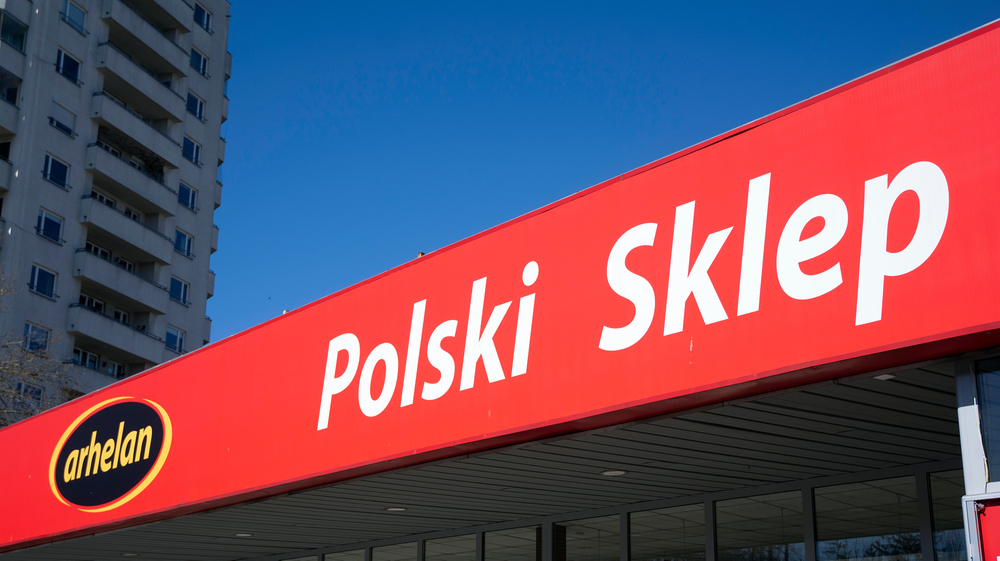
Arhelan is one of Poland’s up-and-coming supermarket chains. It runs more than 100 stores in 50 different cities but is seeking additional growth opportunities. Two of the brand’s most recent branches opened in 2019 in Warsaw.
The Arhelan stores are easy to spot, thanks to their striking red, yellow, and black branding. Most branches are relatively compact, topping out at about 4,000 square feet. Most stores carry common grocery items, as well as alcohol and cleaning supplies.
18. Auchan Supermarket: 33
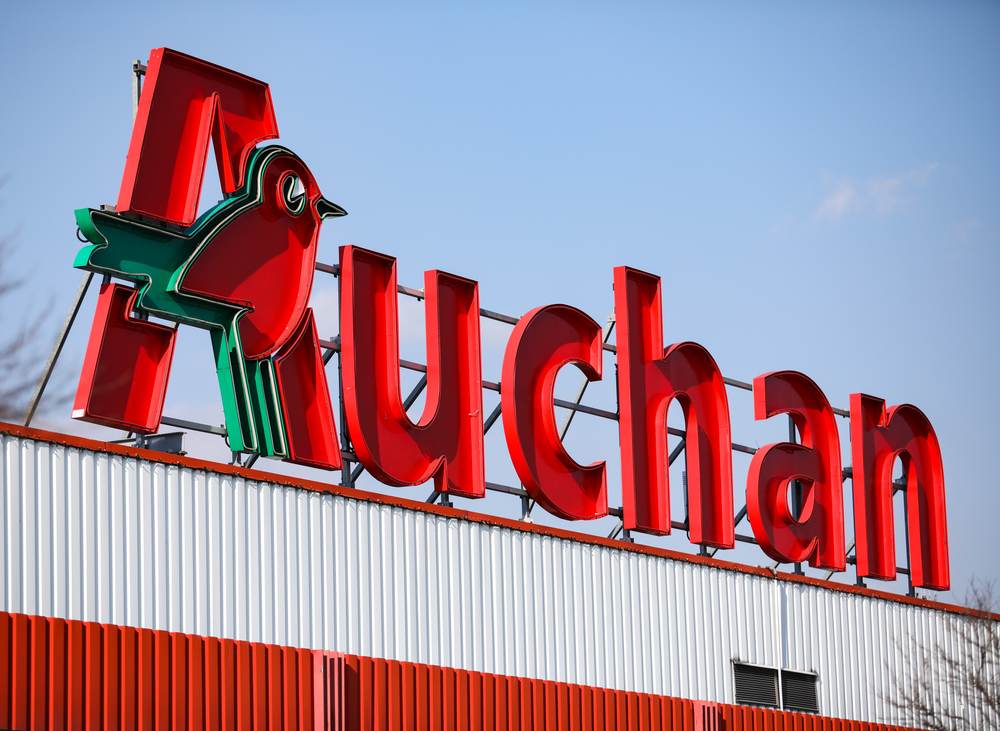
Auchan is a French company that owns more than 100 supermarkets in Poland. The business started in 1961 in Roubaix and has been steadily expanding into countries across Central and Eastern Europe. The company offers both standalone stores and locations that are integrated into shopping malls.
In Poland, Auchan stores are large and impressive. They use the French hypermarket model, offering shoppers a one-stop experience. Most stores feature a large, elevated A or Auchan logo on the exterior of the building.
19. Frac: 21
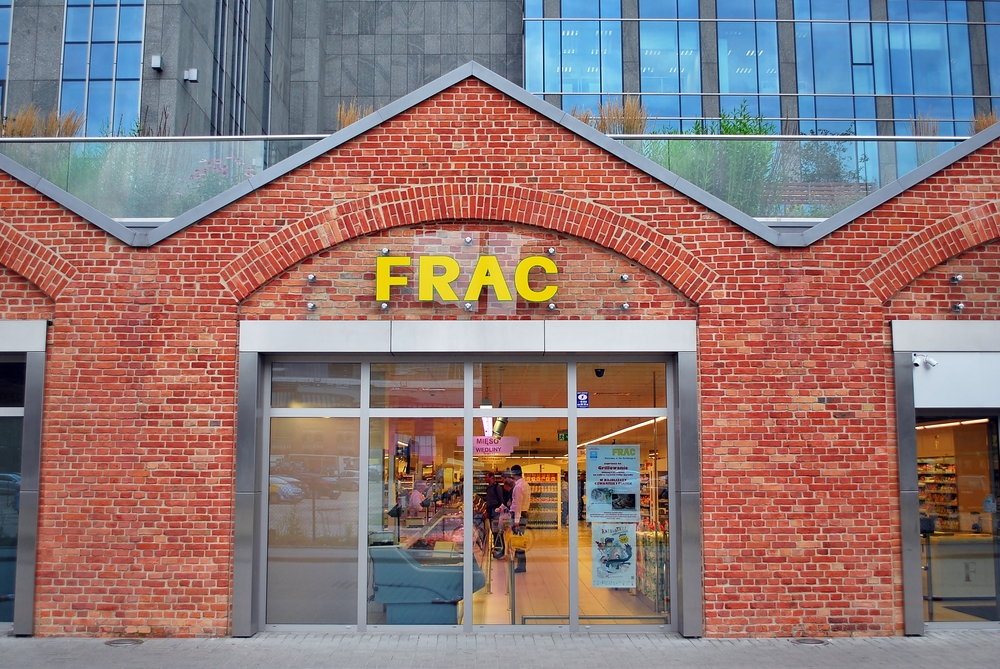
With approximately 20 stores in Poland, Frac is a supermarket chain to watch. The brand is Polish-owned and has been in business since 1994. In addition to supermarkets, it offers industrial products.
Frac supermarkets are often integrated into residential buildings or shopping centers. The bright-yellow branding is simple and modern. Inside each store, you’ll find a wide variety of grocery, deli, and bakery products.
20. Mere (Svetofor): 1
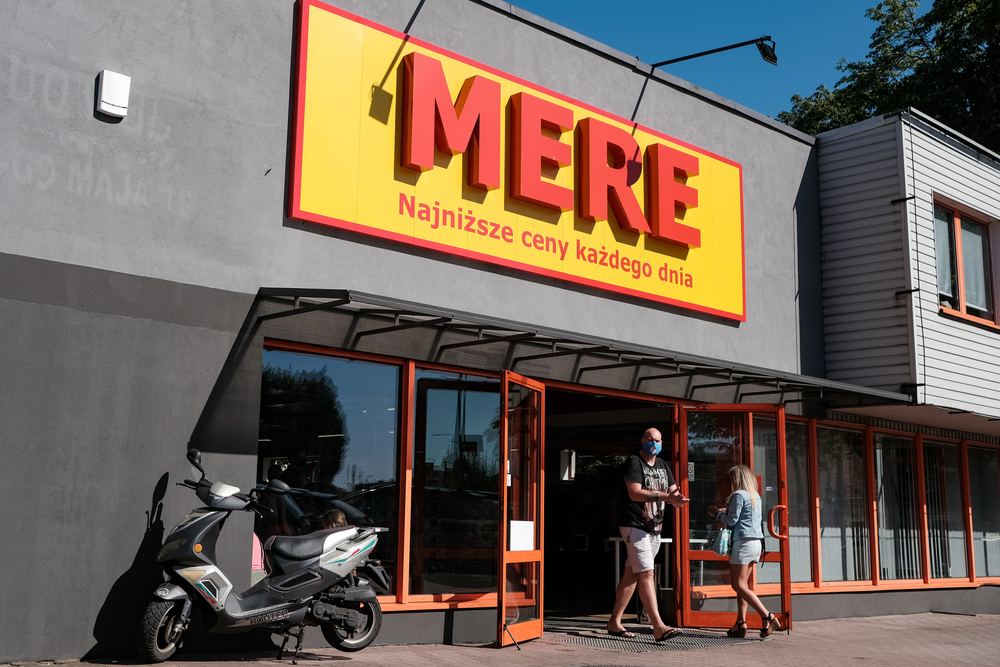
The Mere supermarket chain is a Russian-owned brand. “Mere” is the name used in Europe; in Russia, the company’s stores are called “Svetofor.” You’ll also find Mere stores in Romania, Lithuania, and Belarus.
Mere operates fewer than 10 locations in Poland, but the company has plans for growth. Most Polish locations are located between Lodz and Krakow. All stores use discount pricing and a direct, supplier-to-store model.
Convenience Stores in Poland
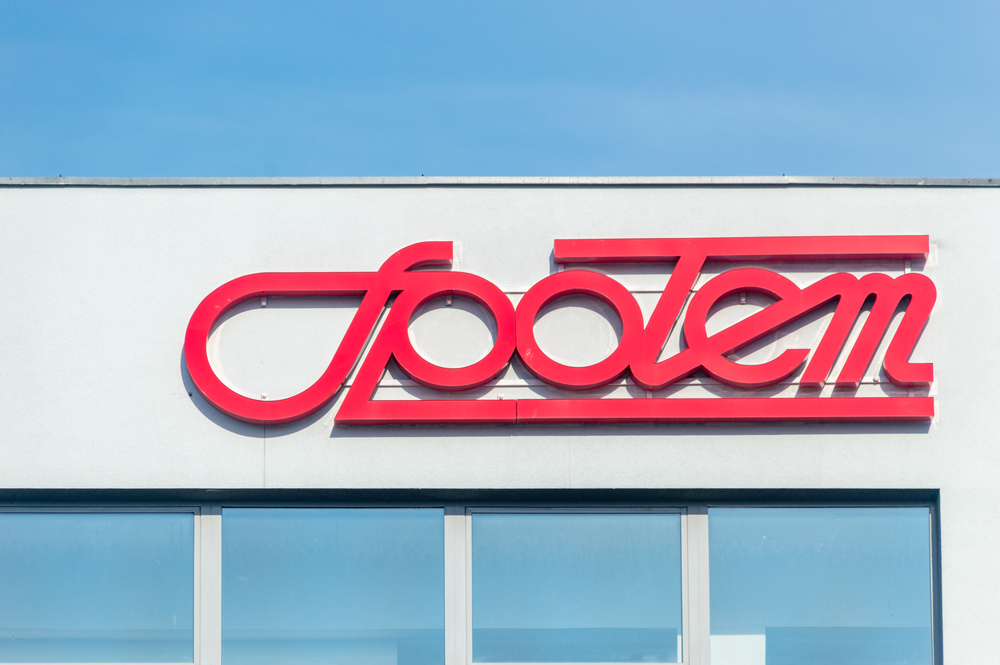
Drive through Poland, and you’ll notice that small convenience stores outnumber large grocery stores. In addition to the popular ABC, Lewiatan, and Livio, the country is home to a range of smaller brands.
Even as shoppers grow accustomed to larger markets, small shops still remain popular. In fact, they’re among the fastest-growing retail chains in the country.
This trend is partly due to Poland’s population distribution. More than 60 percent of the country’s people live in urban areas. Polish cities are often densely packed in, leaving little room for large supermarkets.
When you visit Warsaw or Krakow, you’re much more likely to see an ABC branch than a Biedronka. Large grocery stores usually go up on the outskirts of town, in locations that are inconvenient for many city dwellers.
Poland is also home to a variety of additional convenience-store chains. Some examples are Spolem, Chorten, and Rabat Detal.
Polish Supermarket Chains Going Out of Business
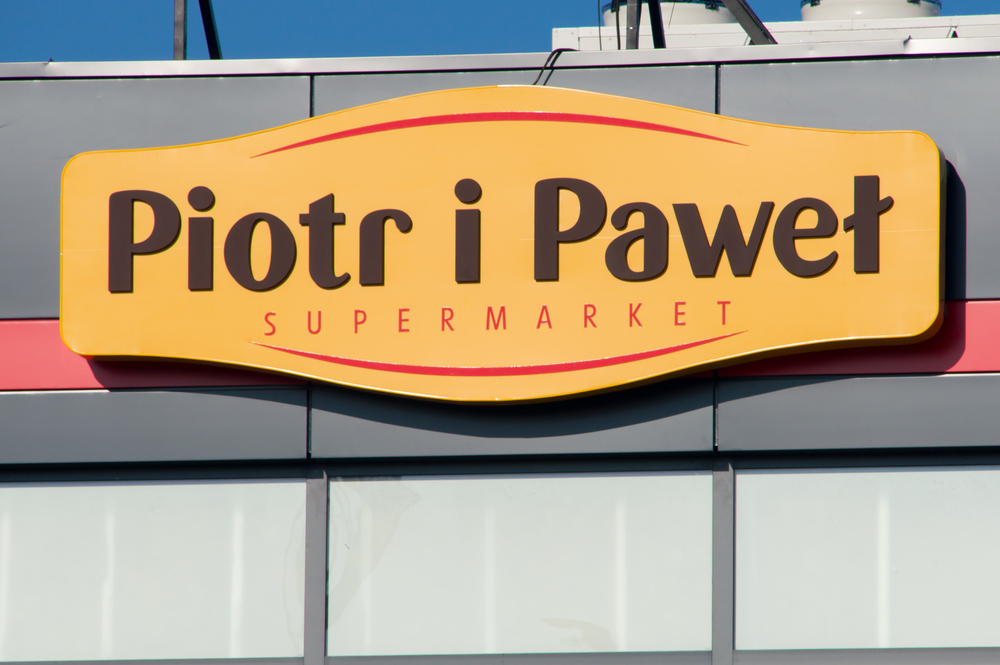
In 2021, a major Polish supermarket chain, Piotr i Pawel, went out of business. The company, which ran upscale grocery stores, was acquired by Spar. Prior to going out of business, the brand was a major player in the premium grocery market.
The downfall of Piotr i Pawel points to a bigger trend in the Polish market: the rise of discount stores. Chains like Aldi and Lidl offer both low prices and a wide selection of grocery items. This combination is attractive to shoppers, particularly when the economy is tough.
Piotr i Pawel started as a delicatessen-style shop, with a small selection and high prices. While its products were high-quality, the brand slowly lost traction in the Polish market. It’s not the only company to meet this fate – the Alma chain went out of business a few years earlier.
After it purchased Piotr i Pawel, Spar decided to rebrand the locations. All of the stores now carry the name Spar, Spar Express, or Eurospar. Spar is a Dutch-owned company based in Amsterdam.
About the Biedronka Supermarket Chain
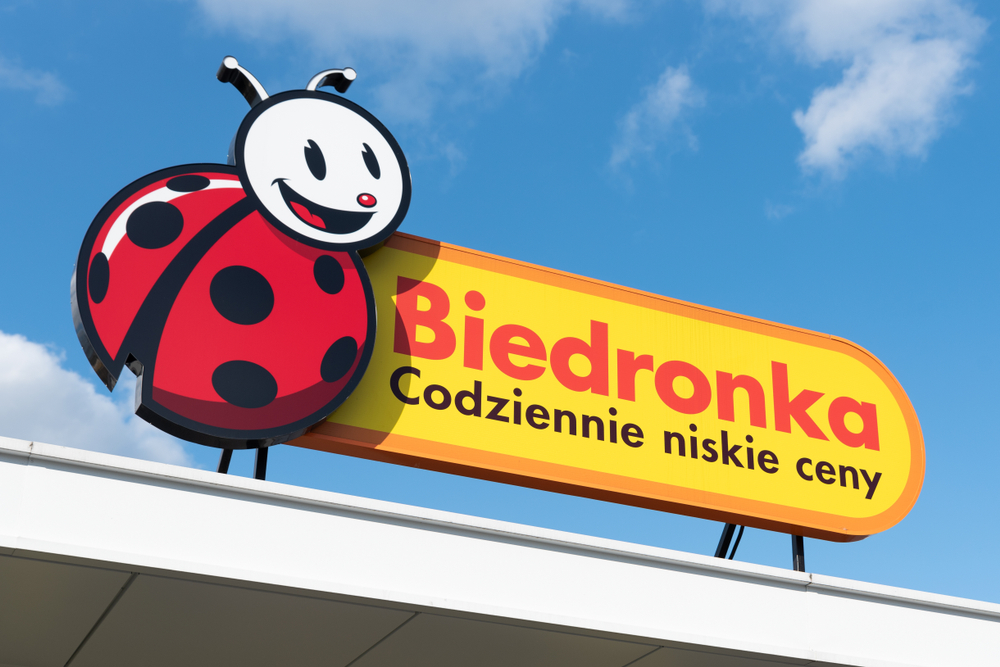
Biedronka has succeeded where many Polish chains have failed. This massive company’s success is in line with shoppers’ evolving preferences.
Young shoppers in Poland have jobs and busy lives; they’re often pressed for time, so they might not want to follow their grandparent’s tradition of shopping for different items at different stores. That’s where stores like Biedronka come in – they carry a huge variety of items, so shoppers can pick up everything they need in one trip.
Biedronka is also using a brute-force approach: by placing stores in many different locations, they’ve increased accessibility and exposure. Customers don’t need to drive far to reach a Biedronka branch.
Currently, Biedronka’s business model is focused on Poland’s major population centers. Most of the company’s stores are concentrated in areas such as Warsaw, Poznan, Lodz, and Szczecin.
In Warsaw alone, there are more than 100 Biedronka locations. Krakow has 60, and Szczecin has 39.
The Biedronka brand also benefits from a big financial backer: Jeronimo Martins. This corporation also owns the Hebe chain, which sells health and beauty items. It also runs businesses in Portugal and Colombia, for a grand total of 4,500 locations.
Auchan Supermarkets in Poland
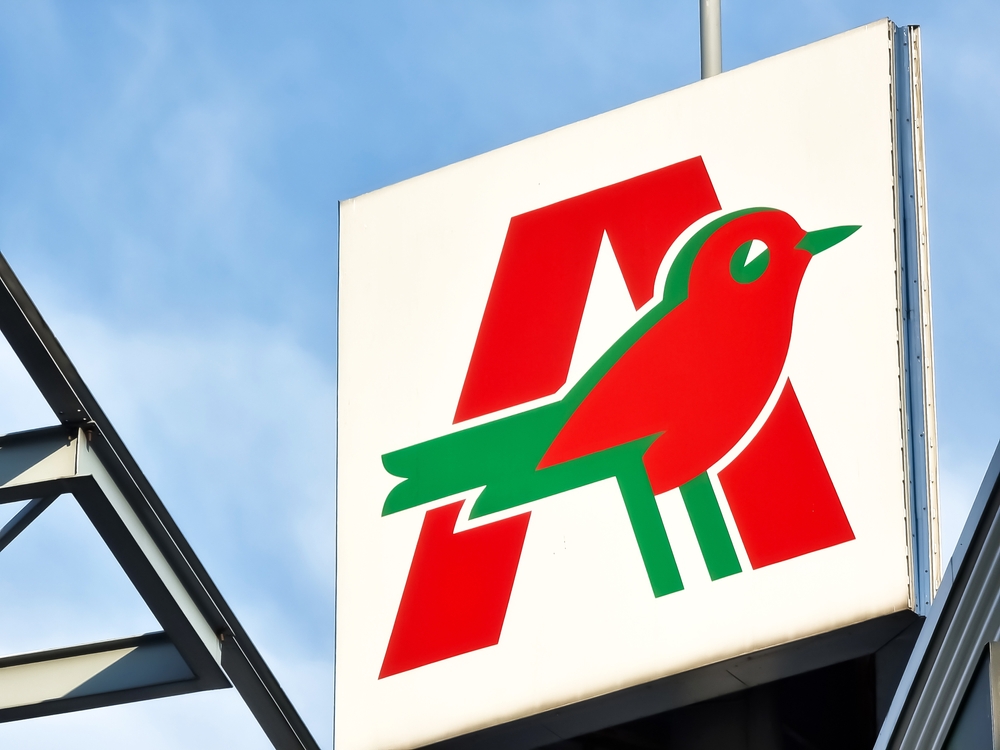
The Auchan brand is another growing supermarket chain in Poland. Although it’s not one of the top 10 chains by size, it brings in a significant amount of revenue.
In Poland, Auchan offers hypermarkets, supermarkets, convenience stores, and shopping centers. Hypermarkets are the company’s main focus; they make up nearly 70 percent of Polish locations.
The first Auchan store opened in Poland in 1996. Since then, the company has continued to add more stores. Most stores are located in the center of the country in Warsaw and Lodz.
Auchan has a more limited reach than Biedronka, but it uses a similar growth strategy. Markets are located in highly populated areas, often in places with higher income levels. The company is unlikely to branch out into extremely rural areas of Poland.
Poland is just one of the places Auchan where is expanding – it also has stores in Spain, Portugal, Romania, Russia, and Ukraine. After Spain and Russia, however, Poland is the brand’s largest foreign market.
Hypermarkets in Poland
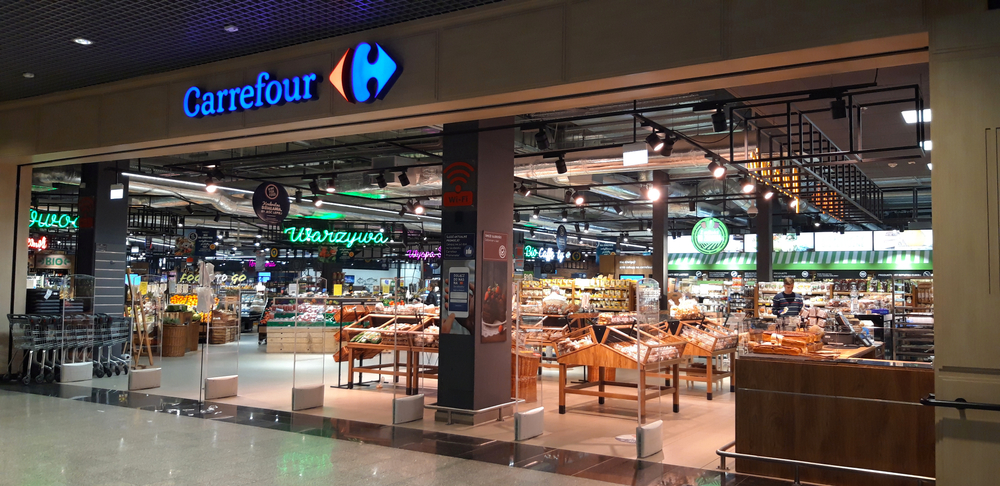
Hypermarkets are a growing trend in Poland. These large, varied stores are becoming increasingly popular with shoppers.
One of the biggest hypermarket brands in Poland is Kaufland. Headquartered in Germany, this company runs 212 different Polish locations. It’s followed by the French brand Carrefour, which runs 90 hypermarkets.
For many years, the British brand Tesco had a large number of hypermarkets and supermarkets in Poland. The last one closed down in 2021. The company had been looking for a way out of Poland for more than a year and ended up selling to Netto.
This may come as a bit of a surprise if you’re familiar with Tesco, which has a strong presence throughout Central Europe. In Poland, however, the company struggled to gain a foothold in the market. After offloading its Polish stores, Tesco will double its expansion efforts in Hungary, Slovakia, and the Czech Republic.

